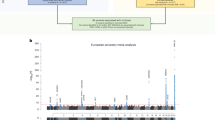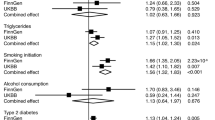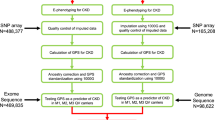Abstract
Pancreatitis is a complex, progressively destructive inflammatory disorder. Alcohol was long thought to be the primary causative agent, but genetic contributions have been of interest since the discovery that rare PRSS1, CFTR and SPINK1 variants were associated with pancreatitis risk. We now report two associations at genome-wide significance identified and replicated at PRSS1-PRSS2 (P < 1 × 10−12) and X-linked CLDN2 (P < 1 × 10−21) through a two-stage genome-wide study (stage 1: 676 cases and 4,507 controls; stage 2: 910 cases and 4,170 controls). The PRSS1 variant likely affects disease susceptibility by altering expression of the primary trypsinogen gene. The CLDN2 risk allele is associated with atypical localization of claudin-2 in pancreatic acinar cells. The homozygous (or hemizygous in males) CLDN2 genotype confers the greatest risk, and its alleles interact with alcohol consumption to amplify risk. These results could partially explain the high frequency of alcohol-related pancreatitis in men (male hemizygote frequency is 0.26, whereas female homozygote frequency is 0.07).
This is a preview of subscription content, access via your institution
Access options
Subscribe to this journal
Receive 12 print issues and online access
$209.00 per year
only $17.42 per issue
Buy this article
- Purchase on Springer Link
- Instant access to full article PDF
Prices may be subject to local taxes which are calculated during checkout


Similar content being viewed by others
References
Etemad, B. & Whitcomb, D.C. Chronic pancreatitis: diagnosis, classification, and new genetic developments. Gastroenterology 120, 682–707 (2001).
Chen, J.M. & Ferec, C. Chronic pancreatitis: genetics and pathogenesis. Annu. Rev. Genomics Hum. Genet. 10, 63–87 (2009).
Witt, H., Apte, M.V., Keim, V. & Wilson, J.S. Chronic pancreatitis: challenges and advances in pathogenesis, genetics, diagnosis, and therapy. Gastroenterology 132, 1557–1573 (2007).
Whitcomb, D.C. What is personalized medicine and what should it replace? Nat. Rev. Gastroenterol. Hepatol. 9, 418–424 (2012).
Whitcomb, D.C. et al. Multicenter approach to recurrent acute and chronic pancreatitis in the United States: the North American Pancreatitis Study 2 (NAPS2). Pancreatology 8, 520–531 (2008).
Yadav, D. & Whitcomb, D.C. The role of alcohol and smoking in pancreatitis. Nat. Rev. Gastroenterol. Hepatol. 7, 131–145 (2010).
Skol, A.D., Scott, L.J., Abecasis, G.R. & Boehnke, M. Joint analysis is more efficient than replication-based analysis for two-stage genome-wide association studies. Nat. Genet. 38, 209–213 (2006).
Whitcomb, D.C. et al. Hereditary pancreatitis is caused by a mutation in the cationic trypsinogen gene. Nat. Genet. 14, 141–145 (1996).
Masson, E. et al. Trypsinogen copy number mutations in patients with idiopathic chronic pancreatitis. Clin. Gastroenterol. Hepatol. 6, 82–88 (2008).
LaRusch, J., Barmada, M.M., Solomon, S. & Whitcomb, D.C. Whole exome sequencing identifies multiple, complex etiologies in an idiopathic hereditary pancreatitis kindred. JOP 13, 258–262 (2012).
Witt, H. et al. A degradation-sensitive anionic trypsinogen (PRSS2) variant protects against chronic pancreatitis. Nat. Genet. 38, 668–673 (2006).
1000 Genomes Project Consortium. A map of human genome variation from population-scale sequencing. Nature 467, 1061–1073 (2010).
Johnson, A.D. et al. SNAP: a web-based tool for identification and annotation of proxy SNPs using HapMap. Bioinformatics 24, 2938–2939 (2008).
Dawra, R. et al. Intra-acinar trypsinogen activation mediates early stages of pancreatic injury but not inflammation in mice with acute pancreatitis. Gastroenterology 141, 2210–2217 (2011).
Van Itallie, C.M. et al. The density of small tight junction pores varies among cell types and is increased by expression of claudin-2. J. Cell Sci. 121, 298–305 (2008).
Amasheh, S. et al. Claudin-2 expression induces cation-selective channels in tight junctions of epithelial cells. J. Cell Sci. 115, 4969–4976 (2002).
Lee, J.H. et al. Immunohistochemical analysis of claudin expression in pancreatic cystic tumors. Oncol. Rep. 25, 971–978 (2011).
Aung, P.P. et al. Differential expression of claudin-2 in normal human tissues and gastrointestinal carcinomas. Virchows Arch. 448, 428–434 (2006).
Sakaguchi, T. et al. Cloning of the human claudin-2 5′-flanking region revealed a TATA-less promoter with conserved binding sites in mouse and human for caudal-related homeodomain proteins and hepatocyte nuclear factor-1α. J. Biol. Chem. 277, 21361–21370 (2002).
Mankertz, J. et al. TNFα up-regulates claudin-2 expression in epithelial HT-29/B6 cells via phosphatidylinositol-3-kinase signaling. Cell Tissue Res. 336, 67–77 (2009).
Suzuki, T., Yoshinaga, N. & Tanabe, S. Interleukin-6 (IL-6) regulates claudin-2 expression and tight junction permeability in intestinal epithelium. J. Biol. Chem. 286, 31263–31271 (2011).
Mankertz, J. et al. Functional crosstalk between Wnt signaling and Cdx-related transcriptional activation in the regulation of the claudin-2 promoter activity. Biochem. Biophys. Res. Commun. 314, 1001–1007 (2004).
Meriläinen, S. et al. Acute edematous and necrotic pancreatitis in a porcine model. Scand. J. Gastroenterol. 43, 1259–1268 (2008).
Liggins, A.P. et al. MORC4, a novel member of the MORC family, is highly expressed in a subset of diffuse large B-cell lymphomas. Br. J. Haematol. 138, 479–486 (2007).
Van den Bossche, J. et al. Claudin-1, claudin-2 and claudin-11 genes differentially associate with distinct types of anti-inflammatory macrophages in vitro and with parasite- and tumor-elicited macrophages in vivo. Scand. J. Immunol. 75, 588–598 (2012).
Ammann, R.W., Akovbiantz, A., Largiader, F. & Schueler, G. Course and outcome of chronic pancreatitis. Longitudinal study of a mixed medical-surgical series of 245 patients. Gastroenterology 86, 820–828 (1984).
Marks, I.N., Bank, S. & Louw, J.H. Chronic pancreatitis in the Western Cape. Digestion 9, 447–453 (1973).
Robles-Díaz, G., Vargas, F., Uscanga, L. & Fernandez-del Castillo, C. Chronic pancreatitis in Mexico City. Pancreas 5, 479–483 (1990).
Irving, H.M., Samokhvalov, A.V. & Rehm, J. Alcohol as a risk factor for pancreatitis. A systematic review and meta-analysis. JOP 10, 387–392 (2009).
Yadav, D., Eigenbrodt, M.L., Briggs, M.J., Williams, D.K. & Wiseman, E.J. Pancreatitis: prevalence and risk factors among male veterans in a detoxification program. Pancreas 34, 390–398 (2007).
Yadav, D. et al. Alcohol consumption, cigarette smoking, and the risk of recurrent acute and chronic pancreatitis. Arch. Intern. Med. 169, 1035–1045 (2009).
Bacanu, S.A., Devlin, B. & Roeder, K. The power of genomic control. Am. J. Hum. Genet. 66, 1933–1944 (2000).
Naj, A.C. et al. Common variants at MS4A4/MS4A6E, CD2AP, CD33 and EPHA1 are associated with late-onset Alzheimer's disease. Nat. Genet. 43, 436–441 (2011).
Hamza, T.H. et al. Genome-wide gene-environment study identifies glutamate receptor gene GRIN2A as a Parkinson's disease modifier gene via interaction with coffee. PLoS Genet. 7, e1002237 (2011).
Purcell, S. et al. PLINK: a tool set for whole-genome association and population-based linkage analyses. Am. J. Hum. Genet. 81, 559–575 (2007).
Yang, J., Lee, S.H., Goddard, M.E. & Visscher, P.M. GCTA: a tool for genome-wide complex trait analysis. Am. J. Hum. Genet. 88, 76–82 (2011).
Klei, L., Kent, B.P., Melhem, N., Devlin, B. & Roeder, K. GemTools: a fast and efficient approach to estimating genetic ancestry. Preprint at http://arxiv.org/pdf/1104.1162. (2011).
Price, A.L. et al. Principal components analysis corrects for stratification in genome-wide association studies. Nat. Genet. 38, 904–909 (2006).
Clayton, D.G. Sex chromosomes and genetic association studies. Genome Med. 1, 110 (2009).
Zheng, G., Joo, J., Zhang, C. & Geller, N.L. Testing association for markers on the X chromosome. Genet. Epidemiol. 31, 834–843 (2007).
Pfützer, R.H. et al. SPINK1/PSTI polymorphisms act as disease modifiers in familial and idiopathic chronic pancreatitis. Gastroenterology 119, 615–623 (2000).
Laemmli, U.K. Cleavage of structural proteins during the assembly of the head of bacteriophage T4. Nature 227, 680–685 (1970).
Towbin, H., Staehelin, T. & Gordon, J. Electrophoretic transfer of proteins from polyacrylamide gels to nitrocellulose sheets: procedure and some applications. Proc. Natl. Acad. Sci. USA 76, 4350–4354 (1979).
Burnette, W.N. “Western blotting”: electrophoretic transfer of proteins from sodium dodecyl sulfate–polyacrylamide gels to unmodified nitrocellulose and radiographic detection with antibody and radioiodinated protein A. Anal. Biochem. 112, 195–203 (1981).
Acknowledgements
Technical support was provided by K. Stello, S. Das, D. Dwyer, A. Rowland, P.A. Blake, M. Ross, C. McGovern, L. Kish, H. Nawaz, S. Solomon, S. Boggiano, R. Ostroff, M. Goss and J. Timm. Data management was provided by L. Silfies and D. Protivnak. Clinical support was provided by S. Boggaino, M. Hendricks, B. Elinoff, L. McHenry, G. Lehman, J. Watkins, E. Fogel and L. Lazzell-Pannell. Additional samples were provided by F. Burton (deceased; St. Louis University School of Medicine); S. Lo (Cedars-Sinai Medical Center, University of California, Los Angeles); M.T. DeMeo (Rush University Medical Center); W.M. Steinberg (Washington Hospital Center); M.L. Kochman (University of Pennsylvania); B. Etemad (Ochsner Medical Center); and H. Zeh, A.J. Moser and K.K. Lee (University of Pittsburgh). This publication was made possible by grants R56DK061451 (D.C.W.), R01DK054709 (D.C.W.), T32DK063922 (D.C.W.), R01MH057881 (B.D. and K.R.), R01CA117926 (J.P.S.), R01DK077906 (D.C.W. and D.Y.), UL1RR024153 and UL1TR000005 from the US National Institutes of Health (NIH). Its contents are solely the responsibility of the authors and do not necessarily represent the official view of the NIH. This project used the University of Pittsburgh Genomics and Proteomics Core Laboratories (UL1RR024153, UL1RR024153 and UL1TR000005) and the University of Pittsburgh Cancer Institute (UPCI) Clinical Genomics Immunoproteomics and Sequencing Facility (NIH P30CA047904). J.L. was supported by Digestive Disease Training Program T32DK063922 (D.C.W.). N.O.Z. was supported by the American Gastroenterology Association John I Isenberg International Scholar Award. The Liverpool cohort was supported by the National Institute for Health Research (NIHR) Biomedical Research Unit award. Additional support was provided by the National Pancreas Foundation (D.C.W.), the Frieda G. and Saul F. Shapira BRCA-Associated Cancer Research Program (D.C.W.) and the Wayne Fusaro Pancreatic Cancer Research Fund (D.C.W.) and Gift of Life Foundation (J.P.S.).
Support for control cohort 1.
Alzheimer's Disease Genetics Consortium (ADGC): The NIH–National Institute on Aging (NIH-NIA) supported this work through the following grants: ADGC, U01AG032984 and RC2AG036528; National Alzheimer's Coordinating Center (NACC), U01AG016976; National Cell Repository for Alzheimer's Disease (NCRAD), U24AG021886; Banner Sun Health Research Institute, P30AG019610; Boston University, P30AG013846, U01AG10483, R01CA129769, R01MH080295, R01AG017173, R01AG025259 and R01AG33193; Columbia University, P50AG008702 and R37AG015473; Duke University, P30AG028377 and AG05128; Emory University, AG025688; Indiana University, P30AG10133; Johns Hopkins University, P50AG005146 and R01AG020688; Massachusetts General Hospital, P50AG005134; Mayo Clinic, P50AG016574; Mount Sinai School of Medicine, P50AG005138 and P01AG002219; New York University, P30AG08051, MO1RR00096 and UL1RR029893; Northwestern University, P30AG013854; Oregon Health & Science University, P30AG008017 and R01AG026916; Rush University, P30AG010161, R01AG019085, R01AG15819, R01AG17917 and R01AG30146; University of Alabama at Birmingham, P50AG016582 and UL1RR02777; University of Arizona, R01AG031581; University of California, Davis, P30AG010129; University of California, Irvine, P50AG016573, P50AG016575, P50AG016576 and P50AG016577; University of California, Los Angeles, P50AG016570; University of California, San Diego, P50AG005131; University of California, San Francisco, P50AG023501 and P01AG019724; University of Kentucky, P30AG028383 and AG05144; University of Michigan, P50AG008671; University of Pennsylvania, P30AG010124; University of Pittsburgh, P50AG005133 and AG030653; University of Southern California, P50AG005142; University of Texas Southwestern, P30AG012300; University of Miami, R01AG027944, AG010491, AG027944, AG021547 and AG019757; University of Washington, P50AG005136; Vanderbilt University, R01AG019085; and Washington University, P50AG005681 and P01AG03991. The Kathleen Price Bryan Brain Bank at the Duke University Medical Center is funded by National Institute of Neurological Disorders and Stroke (NINDS) grant NS39764 and National Institute of Mental Health (NIMH) grant MH60451 and by GlaxoSmithKline. We thank D.S. Snyder and M. Miller who are ex officio ADGC members.
Support for control group 2.
Control group 2 genotypes were obtained from the Genome-Wide Association Study of Parkinson Disease: Genes and Environment, database of Genotypes and Phenotypes (dbGaP) study phs000196.v2.p1. This NeuroGenetics Research Consortium (NGRC) is a gene-environment study of Parkinson's disease. The principal investigator is H. Payami (New York State Department of Health Wadsworth Center, Albany, New York, USA), and the co-investigators are J. Nutt (Oregon Health & Sciences University, Portland, Oregon, USA); C. Zabetian (University of Washington and Puget Sound Veterans Medical Center, Seattle, Washington, USA); S. Factor (Emory University, Atlanta, Georgia, USA); E. Molho (Albany Medical Center, Albany, New York, USA); and D. Higgins (Albany Medical Center and Albany Veterans Medical Center, Albany, New York, USA). Funding was provided by NIH grant R01NS36960. Genotyping was performed by the Genotyping Center at the Johns Hopkins University Center for Inherited Disease Research (CIDR). Funding for genotyping was provided by NIH grant HHSN268200782096C. The NIH contract for the project is entitled 'High throughput genotyping for studying the genetic contributions to human disease'.
Support for the German cohort..
The German cohort was supported by the Alfried-Krupp-von-Bohlen-und-Hahlbach-Foundation (Graduate Schools of Tumour Biology and Free Radical Biology), the Deutsche Krebshilfe/Dr. Mildred-Scheel-Stiftung (109102), the Deutsche Forschungsgemeinschaft (DFG GRK840-E3/E4, MA 4115/1-2/3 and NI 1297/1-1), the Federal Ministry of Education and Research (BMBF GANI-MED 03152061A and BMBF 0314107) and the European Union (EU-FP-7; EPC-TM and EU-FP7-REGPOT-2010-1).
Author information
Authors and Affiliations
Consortia
Contributions
The writing group comprised A.M.K., B.D., D.C.W., J.L., L.K. and M.L.K. Project design, management and coordination were carried out by B.D., D.C.W., D.Y., J.P.N., M.M.B., M.M.L., N.M.M. and S.R.W. Sample collection and phenotyping were performed by A.G., A.S., B.S.S., C.E.F., C.L., C.M.W., D.C., D.C.W., D.Y., F.U.W., G.A.C., G.I.P., J.B., J.D., J.M., J.P.N., J.P.S., J.R., M.A.A., M.E.M., M.J., M.L., M.M.B., M.M.L., M.T., N.M.G., P.A.B., P.B.C., P.S., R.A.H., R.E.B., R.S., S.A., S.S., S.T.A., T.B.G., T.M. and W.G. Genotyping and expression studies were performed by A.M.K., D.J.H., D.S., G.D.S., J.L., J.L.H., J.P.S., L.A.F., L.O., M.A.P.-V., N.O.Z., R.M. and V.K.S. A.M.K. reviewed immunohistochemical staining. Statistical analysis was carried out by B.D., D.Y., K.R., L.K., M.M.B. and M.R.O.
Corresponding authors
Ethics declarations
Competing interests
The authors declare no competing financial interests.
Supplementary information
Supplementary Text and Figures
Supplementary Note, Supplementary Tables 1–6 and Supplementary Figures 1–10 (PDF 1828 kb)
Rights and permissions
About this article
Cite this article
Whitcomb, D., LaRusch, J., Krasinskas, A. et al. Common genetic variants in the CLDN2 and PRSS1-PRSS2 loci alter risk for alcohol-related and sporadic pancreatitis. Nat Genet 44, 1349–1354 (2012). https://doi.org/10.1038/ng.2466
Received:
Accepted:
Published:
Issue Date:
DOI: https://doi.org/10.1038/ng.2466
This article is cited by
-
Expanding ACMG variant classification guidelines into a general framework
Human Genomics (2022)
-
Genetic Testing in Acute and Chronic Pancreatitis
Current Treatment Options in Gastroenterology (2022)
-
Acute Pancreatitis: Diagnosis and Treatment
Drugs (2022)
-
Trypsinogen (PRSS1 and PRSS2) gene dosage correlates with pancreatitis risk across genetic and transgenic studies: a systematic review and re-analysis
Human Genetics (2022)
-
Role of claudins in idiopathic hypercalciuria and renal lithiasis
International Urology and Nephrology (2022)



